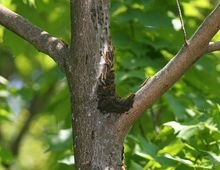According to news sources, a Central Saanich veterinarian is investigating what could be Western Canada's first case of a horse falling seriously ill after eating tent caterpillars.

Group of tent caterpillars in tree
Veterinarians suspect the mare is suffering from a syndrome linked to the ingestion of tent caterpillars that have infested the mare's Saltspring Island farm.
© 2012 by Dave Pape
Veterinarians suspect the animal is suffering from a syndrome linked to the ingestion of tent caterpillars, a syndrome that experts say has been reported in the Eastern United States, but not, to their knowledge, near the West Coast. The insects have infested the mare's Saltspring Island farm.
The owner of the farm said that they had tried to keep their horses from eating the caterpillars, but the farm has been inundated by the caterpillars covering fence posts, dropping from roofs and trees. since horses are grazing animals, it is likely that the affected mare consumed a number of the caterpillars.
The ten-year-old Hanoverian mare Brandy is now undergoing intensive treatment at a Central Saanich animal hospital.
Dr. Nick Shaw, the attending veterinarian says he hasn't seen a case like this on Vancouver Island or the Gulf Islands, but his investigation is in its early stages.
"We're still looking into this, because it's a syndrome that's been reported in the Eastern States, especially Kentucky," said Shaw. "But everything seems to fit."
Mare reproductive-loss syndrome affects reproductivity and causes late-term miscarriages, as well as pericardium infections.
A particularly bad outbreak in 2001 affected several hundred mares in Kentucky and surrounding states - causing a loss of about $300 million to the equine industry, according to the American Association of Equine Practitioners.
In addition to the currently sick mare, two mares from Brandy's southern Saltspring Island farm suffered miscarriages in the past month.
The owner of the farm breeds horses as a hobby and said the loss of the two foals was particularly devastating. They were the only two mares impregnated with semen ordered specially from Germany.
Typically, the foals would have been born before the explosion of tent caterpillars, but the Frasers bred them later in the season.
They also continue to be concerned about Brandy, who has lost weight since becoming ill. The mare remains in hospital, where a drain continues to remove fluid. Shaw said her condition is improving, but it's possible the fluid build-up will recur or the pericardium will be damaged.
This year marks the biggest spike in western tent caterpillar populations on Vancouver Island since 2005. However, the peak has already passed for the season, said Michelle Gorman, integrated pest-management co-ordinator for the City of Victoria Parks Division.
The reddish-brown caterpillars are marked with red and blue dots. They feed in groups on deciduous trees and their populations rise and fall in five-to 10-year cycles. Typically they are kept in check by natural predators.
To control the caterpillars, the City of Victoria recommends pruning nests in a way that won't cause structural damage to trees, as well as submerging them in soapy water or stomping on them prior to disposing of them in a compost bin. Live caterpillars should not be placed in the garbage, as they may eat their way through the bags.
